
Hinchinbrook Island is an island in the Cassowary Coast Region, Queensland, Australia. It lies east of Cardwell and north of Lucinda, separated from the north-eastern coast of Queensland by the narrow Hinchinbrook Channel. Hinchinbrook Island is part of the Great Barrier Reef Marine Park and wholly protected within the Hinchinbrook Island National Park, except for a small and abandoned resort. It is the largest island on the Great Barrier Reef. It is also the largest island national park in Australia.

Ingham is a rural town and locality in the Shire of Hinchinbrook, Queensland, Australia. It is named after William Bairstow Ingham and is the administrative centre for the Shire of Hinchinbrook.
Parramatta State School is a public co-educational primary school located in the Cairns suburb of Paramatta Park, Queensland, Australia. It is administered by the Department of Education, with an enrolment of 443 students and a teaching staff of 53, as of 2023. The school serves students from Prep to Year 6, and is one of the oldest schools within the Cairns region.

North Queensland or the Northern Region is the northern part of the Australian state of Queensland that lies just south of Far North Queensland. Queensland is a massive state, larger than many countries, and its tropical northern part has been historically remote and undeveloped, resulting in a distinctive regional character and identity.
West End is an inner suburb of Townsville in the City of Townsville, Queensland, Australia. In the 2021 census, West End had a population of 3,891 people.

Lucinda is a coastal town and locality in the Shire of Hinchinbrook, Queensland, Australia. In the 2021 census, the locality of Lucinda had a population of 435 people.

Bowenville is a rural town and locality in the Toowoomba Region, Queensland, Australia. The town's economy rested on the rail industry and with the winding down of the railways the population declined. In the 2021 census, the locality of Bowenville had a population of 219 people.

Rollingstone is a rural town and coastal locality in the City of Townsville, Queensland, Australia. In the 2021 census, the locality of Rollingstone had a population of 133 people.

St Teresa's College, Abergowrie is an independent Catholic secondary day and boarding school for boys, located in Abergowrie, approximately 40 kilometres (25 mi) north west of Ingham, in Far North Queensland, Australia.
Forrest Beach is a coastal locality in the Shire of Hinchinbrook, Queensland, Australia. In the 2021 census, Forrest Beach had a population of 1,364 people.

Trebonne is a rural town and locality in the Shire of Hinchinbrook, Queensland, Australia. In the 2021 census, the locality of Trebonne had a population of 430 people.

Abergowrie is a rural town and locality in the Shire of Hinchinbrook, Queensland, Australia. In the 2021 census, the locality of Abergowrie had a population of 305 people.
Victoria Plantation is a rural locality in the Shire of Hinchinbrook, Queensland, Australia. In the 2021 census, Victoria Plantation had a population of 169 people.

Mount Fox is a rural locality in the Shire of Hinchinbrook, Queensland, Australia. In the 2021 census, Mount Fox had a population of 84 people.
Lannercost is a rural locality in the Shire of Hinchinbrook, Queensland, Australia. In the 2021 census, Lannercost had a population of 168 people.
Long Pocket is a rural locality in the Shire of Hinchinbrook, Queensland, Australia. In the 2021 census, Long Pocket had a population of 150 people.
Dalrymple Creek is a locality in the Shire of Hinchinbrook, Queensland, Australia. In the 2021 census, Dalrymple Creek had a population of 51 people.
Garrawalt is a rural locality in the Shire of Hinchinbrook, Queensland, Australia.
Aitkenvale State School is a public co-educational primary school located in the Townsville suburb of Aitkenvale, Queensland, Australia. It is administered by the Queensland Department of Education, with an enrolment of 349 students and a teaching staff of 39, as of 2023. The school serves students from Prep through to Year 6.












